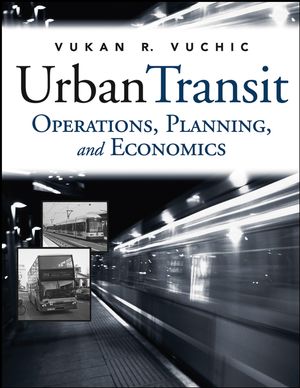Urban Transit: Operations, Planning, and EconomicsISBN: 978-0-471-63265-8
Hardcover
672 pages
February 2005
 |
||||||
1 Preface xiii
Acknowledgments xv
PART I TRANSIT SYSTEMS OPERATIONS AND NETWORKS 1
TRANSIT OPERATIONS AND SERVICE SCHEDULING 3
1.1 Basic Operating Elements, 4
1.2 Information Files and Data Collection: Surveys and Counts, 22
1.3 Transit Travel Characteristics, 28
1.4 Scheduling of Service, 44
2 CAPACITY, SPEED, ACCELERATED AND SPECIAL OPERATIONS 78
2.1 Transit Line Capacity, 78
2.2 Increase of Transit Speed, 98
2.3 Stops and Stopping Regimes, 114
2.4 Accelerated Rail Transit Operations with Fixed Stopping Schedules, 118
2.5 Scheduling of Single-Track Lines, Circle Lines, and Trunk Lines with Branches, 140
3 MODELING AND OPTIMIZATION IN TRANSIT SYSTEMS ANALYSIS 158
3.1 Application of Systems Analysis in Transit, 159
3.2 Conceptual Models, 162
3.3 Mathematical Modeling Procedure and Applications, 166
3.4 Applications of Simulation Methodology, 178
3.5 Evaluation of Systems Analysis and Operations Research in Transit, 179
4 TRANSIT LINES AND NETWORKS 185
4.1 Planning Objectives, Principles, and Considerations, 186
4.2 Geometry of Transit Lines, 191
4.3 Types of Transit Lines and Their Characteristics, 201
4.4 Transfers in Transit Networks, 215
4.5 Timed Transfer System Networks, 224
4.6 Transit Network Types and Their Characteristics, 234
4.7 Analysis of Metro Network Geometric Forms, 248
5 PLANNING OF RAIL TRANSIT STATION LOCATIONS 268
5.1 Objectives in Station Location Planning, 268
5.2 Passenger Travel Time, 269
5.3 Other Objectives in Station Location Selection, 278
5.4 Integration of Objectives, 283
5.5 Addition or Closing of a Station, 285
5.6 Area Coverage versus Operating Speed, 285
5.7 Station Spacings on Actual Rail Transit Networks, 289
PART II TRANSIT AGENCY ECONOMICS AND ORGANIZATION
6 TRANSIT AGENCY OPERATIONS, ECONOMICS, AND MARKETING 299
6.1 Organizational Structure of Transit Agencies, 299
6.2 Management and Personnel, 303
6.3 Transit System Statistics, Performance, and Economic Measures, 308
6.4 Transit Agency Operations, 315
6.5 Transit System Full Accessibility, 340
6.6 Information System for Passengers, 350
6.7 Marketing and Public Relations, 360
7 TRANSIT FARES 374
7.1 Objectives in Transit Fare Determination, 374
7.2 Fare Collection, 376
7.3 Fare Structures, 384
7.4 Special Higher and Lower Fares, 389
7.5 Fare Level, 394
8 FINANCING OF TRANSIT 408
8.1 Principles and Trends in Financing Transit Services, 408
8.2 Sources of Local and State Funds for Transit, 413
8.3 Federal Funding of Transit, 419
8.4 Improving the Efficiency of Transit Agencies, 423
9 TRANSIT OWNERSHIP, REGULATION, AND ORGANIZATION 429
9.1 Private Transit Companies and Public Takeover, 429
9.2 Ownership and Forms of Transit Systems, 434
9.3 Integration of Transit Services Provided by Different Operators, 438
9.4 Regulation of Transit Services, 440
9.5 Unregulated Transit Services, 445
9.6 Evolving Forms of Transit Ownership,
PART III TRANSIT SYSTEMS PLANNING AND MODE SELECTION
10 TRANSIT SYSTEMS PLANNING 469
10.1 Purpose and Organization of Transit Planning, 469
10.2 Planning Procedure and Methodology, 479
10.3 Travel and Transit Demand Forecasting, 487
10.4 Transit Plan Development, Evaluation, and Selection, 500
10.5 Review of the Process and Trends in Transit Planning, 512
11 ANALYSIS, EVALUATION, AND SELECTION OF TRANSIT MODES 519
11.1 Evaluation and Selection of Public Projects, 519
11.2 Transit Mode Evaluations, 522
11.3 Definition of the Conditions Set, 528
11.4 Formulation, Comparison, and Selection of Candidate Modes, 544
12 PLANNING AND SELECTION OF MEDIUM- AND HIGH-PERFORMANCE TRANSIT MODES 553
12.1 Basic Elements of Transit Modes, 553
12.2 Medium-Performance Transit Modes, 568
12.3 High-Performance Transit Modes, 592
Appendix I SI and English Units and Conversion Factors, 615
Appendix II List of Abbreviations, 621
Appendix III Definitions of Transit Systems Terms, 623
Appendix IV Answers to Selected Exercise Questions, 633
Index 641



